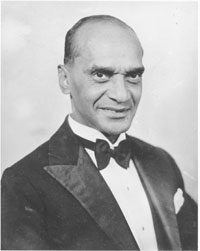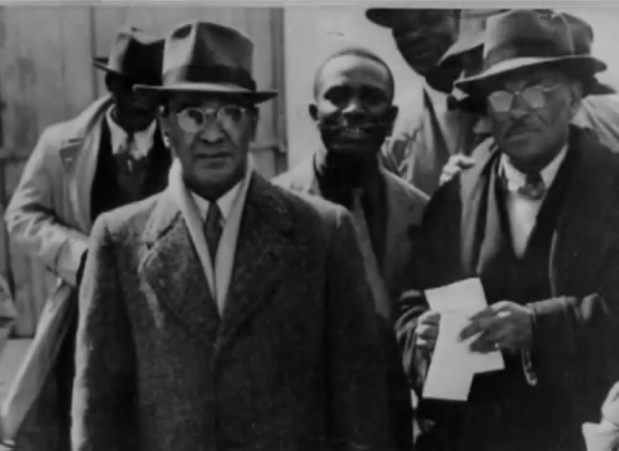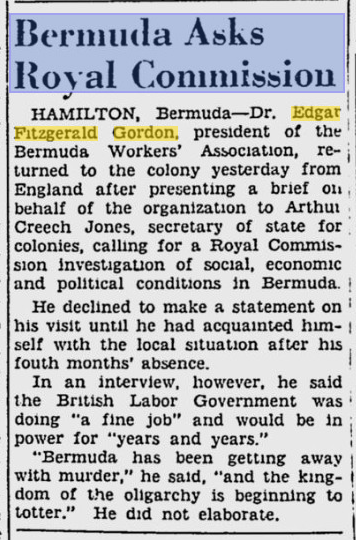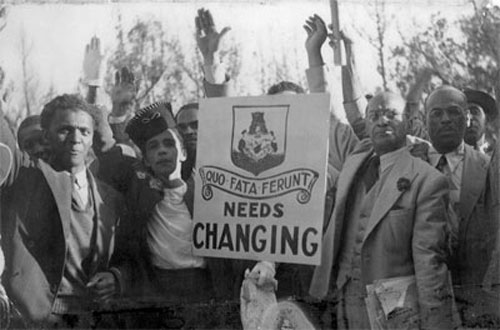National Hero Profile: Dr. E.F. Gordon
 Isolated geographically and isolationist in nature, Dr. Edgar Fitzgerald Gordon [1895-1955] arrived in a Bermuda which remained determinedly remote from developments in the outside world.
Isolated geographically and isolationist in nature, Dr. Edgar Fitzgerald Gordon [1895-1955] arrived in a Bermuda which remained determinedly remote from developments in the outside world.
Born in Trinidad and educated in Scotland, Dr. Gordon came to Bermuda to open a West End medical practice in 1924. He encountered ingrained racial, social and political practices on the island which not only offended his sense of natural justice but which struck him as being decades’ out of step with the realities of the times.
Dr. Gordon, who boasted a scalpel-keen intellect, a powerful gift for oratory and an uncompromising sense of integrity, quickly established himself as one of the most powerful forces for change in a 20th century Bermuda which resolutely clung to outmoded and oligarchic 19th century traditions.
Not only did the island’s patriarchal leadership of white merchants stubbornly resist any proposed changes to a social and political order which entrenched and perpetuated their economic clout, Bermuda’s blacks seemed to passively accept their second-class circumstances and the island’s prevailing — but hopelessly antiquated — value systems.
This week Government announced Dr. Gordon, his one-time adversary and later partner in reform Sir Henry Tucker and Roosevelt Brown [ Dr. Pauulu Kamarekafego] who succeeded him in the vanguard of efforts to restructure Bermudian society and politics, would be inducted as National Heroes in June.
Beginning as a letter writer to newspapers, Dr. Gordon quickly established himself as a passionate advocate for Bermuda’s disenfranchised and dispossessed.
As a tireless proponent of reform in an island which stubbornly resisted even incremental steps which might advance its stalled social development, he had few equals. In a Bermuda which insisted on remaining a Victorian outpost in a 20th century world where transformation was the only constant, Dr. Gordon prided himself on being an indefatigable agent of change.
Dr. Gordon championed the rights of black Bermudian nurses — whose American qualifications were not fully recognised by local medical authorities — to work in King Edward VII Memorial Hospital. And he took up the cause of Bermudian tradesmen working on the US new bases to earn the same higher wages as their American counterparts — a move strongly opposed by Bermuda’s political and business elite in case it produced an inflationary spiral in the local construction industry.
By the 1940s he was attending to the island’s social as well as its medical needs on a full-time basis. Recruited to head the Bermuda Workers Association [the predecessor to the Bermuda Industrial Union, the island's first modern labour movement emerged from the dispute involving Bermudians helping to construct the US bases in 1944],
Dr. Gordon’s galvanising presence at the helm helped to draw some 5000 new members to that organisation by 1946. The same year he was first elected as a a Member of Colonial Parliament after two earlier failed attempts.
Bermuda’s highly restricted franchise — in 1936 fewer than 10 percent of the island’s 30,000 residents could vote, with only adult male property owners entitled to cast ballots — was one of of the chief targets of Dr. Gordon’s reformist zeal.
He believed his overriding goals of advancing social and economic conditions for black Bermudians and ending racial segregation and its associated indignities could not be achieved without first overhauling a political system which maintained the ruling oligarchy’s whiphand in local affairs.
“Democracy’ is a mockery as far as Bermuda is concerned,” said Dr. Gordon.
During during the 1946 by-election campaign which saw him returned as a St. George’s MCP, Dr. Gordon made the limited franchise a central issue.
“In Bermuda they tell you if there was a Universal Franchise the island would blow up; that the tourist trade would vanish if they had to mingle freely with Negroes,” he said. “But why is it one could hardly get in to the Clay House and Mount Area restaurants because of the number of tourists who go there to be with the coloured people.
“It is your duty to send me to Parliament to ask them to explain their double talk.”
For the rest of his life politics was to be the crucible for Dr. Gordon’s energies. The BWA — with its all-inclusive vision of a Bermudian society where all would share in the fruits of their labours — proved to be a more effective platform for Dr. Gordon than the House of Assembly. There both his freedom of action and supposedly unrestricted freedom of speech were frequently blunted by Parliamentary manoeuvres and delaying tactics.
In 1946 Dr. Gordon travelled to London to deliver a petition organised by the BWA to the British Colonial Secretary about prevailing social and political inequities in Bermuda. This was a masterful exercise in political theatre on Dr. Gordon’s part, stage-managed to draw attention from the UK’s national newspapers — and the broader British public — because of his inflammatory claims the island’s Governor would rather the document “had been thrown into the waste-basket” rather than be passed on to the Colonial Office.
Dr. Gordon declared the petition — which he was instrumental in drafting — was made “on behalf of the great majority of the under-privileged and suffering inhabitants.” It alleged that trade unions had virtually no political rights and were in the same position as British unions 40 years ago; protested at the absence of social security, workmen’s compensation, and health and unemployment insurance; declared that, with a few exceptions in the lower grades, Civil Service posts were reserved for the white population; and criticised the existing Parliamentary franchise.
The petition was debated in the British Parliament which condemned many of the practices highlighted in the petition but nevertheless refused Dr. Gordon’s request to empanel a Royal Commission to investigate social, political and economic conditions on the island. Instead, the UK referred the matter back to Bermuda’s House of Assembly for its “earnest consideration.”
Dr. Gordon was back in Bermuda in 1947 when the petition which condemned “the dangers of oligarchical government” on the island was debated. The Parliamentary meeting attracted unprecedented numbers of placard-waving BWA members and supporters to the House of Assembly grounds demanding the immediate end to segregation and the extension of full political and civic rights to black Bermudians.
But when the report of a Joint Committee of the Bermuda Legislative Council and House of Assembly on the matters raised in the petition was finally issued in April, 1948, the results were predictable. And bitterly disappointing.
The Committee held that “the early adoption of adult franchise would be prejudicial to the best interests of Bermuda,” on the grounds that: (a) in larger countries universal suffrage was “disciplined and controlled by a party system,” which would be unsuitable for Bermuda because of its small size and because of the “important part personal considerations play in political life.”
Dr. Gordon accepted this setback in stride, perhaps recognising the urgent forces for reform which had been unleashed in Bermuda could not now be contained. Change was inevitable. And change would arrive on its own timetable no matter how much foot-dragging the reactionary elements arrayed against it engaged in.
“No part of the modern world, however small, can isolate itself from world events,” said the Royal Institute of International Affairs, writing about Dr. Gordon’s profound impact on Bermuda’s petrified social system shortly after the British House of Commons debated the BWA petition. “This is especially true when these events impinge on a unique meeting place of the two greatest English-speaking democracies, the small picturesque British colony of the Bermudas.
“In many aspects of its economic, political and social life, Bermuda, even until the ’30s of this century, managed to preserve an isolation from the trend of modern political and social thought. This parochialism was maintained in spite of the constant and numerous contacts established by the passage of tens of thousands of visitors through the colony and the frequent excursions of Bermudians beyond their native shores.
“It is a question of how far this policy of being in the world but not of the world is due to an isolationism and defensiveness to outside criticism inherent in most islanders; but the slogan is ‘Bermuda is different’ has been, and still is, the conservative Bermudian’s chief explanation why he resists tendencies predominant elsewhere.
The photo below, courtesy of the BIU, was taken during a 1948 demonstration, and shows Dr. Gordon on the right, with Gerald Brangman and Trew Wright Robinson:
“Unless this attitude of mind is appreciated, an understanding of many of Bermuda’s problems is difficult, if not impossible. Perhaps the survival of horse and buggy transport is the most vivid and visible example of this attempt to preserve a different way of life …”
But just as horses and carriages gave way to automobiles in 1948, so did Bermuda’s other increasingly futile efforts to resist the encroachments of modernity also begin to crumble. As Dr. Gordon had anticipated, change had its own irresistible momentum– a momentum Bermuda’s oligarchs were in no position to either ignore or defy.
Although he lost his House of Assembly seat at the 1948 election — his preoccupation with a dock workers dispute that year had limited the time he could devote to his Parliamentary duties — but he was reelected in 1953 and almost immediately demonstrated his powers of political showmanship had not diminished during his absence.
Newly-crowned Queen Elizabeth II was about to embark on a world tour of the Commonwealth beginning with a visit to Bermuda — the first by a reigning monarch. The video below, filmed during the Queen’s visit in 1953, shows an aeriel view of Bermuda, the Queen’s arrival, crowds gathering, the Queen being transported around the island in a horse and carriage and more. [no sound]
When Dr. Gordon caught sight of the guest lists for events being planned in her honour he was enraged — as well as confident he had discovered a means of focussing the world’s attention on Bermuda’s racially-stratified social system. Only 60 of more than a thousand guests invited to a Government House garden party for the Queen were black — and not a single black Bermudian had been asked to attend a state dinner for the monarch.
As Dr. Gordon predicted, this proved to be red meat to Britain’s left-leaning Fleet Street newspapers when he passed the story on to them.
“The newspapers ‘Daily Mirror’ and ‘Daily Herald’ today angrily protest the absence of any Negro representative at a state banquet in Bermuda welcoming the Queen,” said a Reuter news service report on the ensuing uproar in London. ” The pro-Labour ‘Mirror’ tells its 4.5 million readers that officials in Bermuda had blundered and demanded ‘an end to blind snobbery’.
“The ‘Daily Herald’, newspaper of the Labour Party and trade unions , said Sir Alexander Hood, governor of the colony has insulted more than 500,000,000 people in the British commonwealth.
“Both papers flatly reject Hood’s explanation that the list of 30 guests invited to the banquet was drawn up according to precedent. ‘Why weren’t the top 30 knocked off the stupid list’, asks the ‘Mirror’, which points out 60 percent of Bermuda’s population is coloured. ‘To blazes with the first families of Bermuda. Offend them for a change’ …
The “Daily Herald” editorial said: “Perhaps others may benefit from this instance of gross ill manners. It is time everyone from Governors downwards grasped the facts about this British Commonwealth. Within its frontiers coloured people outnumber whites by more than eight to one. One of the moral pledges by which it is held together tis that the colour bar should be utterly destroyed as speedily as possible …”
The Queen set foot in Bermuda the day the story broke. She was photographed that same afternoon meeting a broadly smiling, tail-coated Dr. Gordon in St. George’s. Despite his progressive politics, the Scottish-educated physician was an unapologetic monarchist. Aside from the invaluable publicity value inherent in the Bermuda snub, he was genuinely aggrieved the island’s officials had placed the young Queen in such an undiplomatic situation on her first overseas trip since ascending the throne.
Also in 1953 Dr. Gordon was appointed to the House of Assembly’s Inter-Racial Committee — created at the prompting of British political and diplomatic officials growing increasingly exasperated with the slow pace of meaningful change in Bermuda. The nine-member committee, comprised of four black and five white MCPs, was chaired by Sir Henry Tucker.
Although a frequent adversary of Dr. Gordon’s in both the political and labour spheres, Sir Henry did come to share his strategy — if not all of his tactics — for advancing reform and opportunity in Bermuda.
The final report issued by the Inter-Racial Committee appeared in 1954, just a few months before Dr. Gordon’s death. While recognising the need for a sea-change in Bermudian political, social and economic conditions, the report — its conclusions endorsed by the entire committee — was annoyingly vague on details.
An ailing Dr. Gordon was criticised for not submitting a minority report on behalf of the committee’s black members. But by this point his health was in serious decline — and his complicated domestic life had been a source of both stress and Bermuda grapevine gossip since he had separated from his wife in the 1930s.
He may well have seen the report as a sensible road map for going forward rather than as a nuts-and-bolts blueprint for implementing change. If that was the case, he certainly wasn’t alone in holding this view.
Although some Bermudians were disappointed by its broad brush approach to rectifying the island’s racial injustices, the report had its black supporters both here and abroad.
“The vacation paradise of Bermuda, long associated with racial prejudice in the minds of Americans, has within the past few years been undergoing some startling and heartening changes,” said a 1954 African-American analysis of the Inter-Racial Committee’s work. “The walls of discrimination built during the 30 years that the islands have beckoned white Americans have begun to crack under the ever strengthening opposition of an enlightened and aroused colored population …
“Of prime importance in this ‘new look’ in Bermuda have been the concerted efforts of the nine coloured legislators in the House of Assembly. Just two weeks ago, they guided through Parliament a report which not only takes official cognisance of inequalities in the treatement of colored Bermudians but which goes on record with recommendations for improved race relations.
The unanimous recomnendations press for equal opportunities for colored in nursing, under civil service and in schools which are segregated. More equitable representation in both house of Parlaiment and the opening of an interracial technical high school are aloss salient points in the report.”
Dr. Gordon died of a heart attack on April 20, 1955. He was 60 years old. His funeral service, attended by thousands of Bermudians, was held at St. Theresa’s Roman Catholic Cathedral. The “Bermuda Recorder”, the island’s black-owned newspaper, eulogised him as a trailblazer, a genuine social reformer and a hero, saying “no man had so fired the imagination and alerted the inarticulate masses as he did.”
In the House of Assembly, Sir Henry Tucker was the only white MCP to pay tribute to a former antagonist he had come to admire for his courage, determination and singularity of purpose: “I am satisfied the community has suffered a loss,” he said. “I myself regret his death and hope members of his group and mine will agree that his methods of association and compromise have set a very admirable pattern. I am expressing a personal sense of regret he can no longer be with us.”
Dr. Gordon’s youngest daughter, Pamela, was born to his companion Mildred Layne Bean six months after his death. The first woman and the youngest person to hold the office of Premier in Bermuda at the age of 41, she was a beneficiary of both her father’s political talents — and the sweeping progress he set in motion.
Within a few years of Dr. Gordon’s death, the Progressive Group’s 1959 Theatre Boycott ended officially sanctioned segregation in Bermuda’s public places following a boycott of the island’s cinemas. Shortly afterwards the Committee for Universal Adult Suffrage headed by Roosevelt Brown [later Dr. Pauulu Kamarakafego] was formed, prompting an urgent island-wide debate on the need for wholesale political reform.
The walls of discrimination weren’t just cracking now, they had started to crumble. In 1963 CUAS’ efforts resulted in the franchise being extended to all Bermudians over the age of 25 as well as British citizens resident in Bermuda for more than three years.
“In retrospect, the Parliamentary Election Act 1963, whilst falling far short of achieving all of the objectives espoused by CUAS, represented an interim compromise formula which only partially addressed the wishes of both extremes of the political spectrum — the ultra-conservatives and the reformists,” said James E. Smith, former Clerk to the Legislature and Assistant Cabinet Secretary in a history of the evolution of Bermuda’s Parliamentary franchise. “Nonetheless, it did set the stage for the more progressive changes which were to follow …”
The Progressive Labour Party was formed that same year [some of its founding fathers described themselves as "Gordonites"] as the political arm of the labour movement originally organised and energised by the transplaned Trinidadian doctor, while the United Bermuda Party — a pro-business but multi-racial grouping headed by Sir Henry Tucker — was established in 1964.
Bermuda’s first Constitutional Conference was convened in London in 1966, with eight United Bermuda Party and three Progressive Labour Party representatives attending along with members of the unelected Legislative Council and Independent politicians from the House of Assembly. This meeting culminated in the drafting of Bermuda’s first written Constitution which not only enshrined Universal Suffrage for adults 21 and older and provided the island with formal responsibility for internal self-government but formally extended full civic and legal rights to all Bermudians.
As Dr. Gordon had envisaged, the forces of change had taken on an irresistible momentum — one which ensured Bermuda could no longer maintain an unviable and unsustainable policy of being in the modern world but not of the world.
- Check back tomorrow for another National Hero profile
Read More About
Comments (10)
Trackback URL | Comments RSS Feed
Articles that link to this one:
- Dr E.F. Gordon’s Son Ken Gordon Dies At 86 | Bernews.com | November 7, 2013





Finally someone else we can admire. We have so many people that have contributed to the well-being of this country and should give honour to a different one each year.
There is so much that can be said about Dr. E. F. Gordon and his family. Hopefully, more information will be printed in the media as heroes day approaches to educate the public on who he was to us as a people and as labour workers. History must be told for it shaped Bermuda bringing about much needed change for blue and white collar workers alike.
It is sad that many persons under thirty did not even know who Dr. Barbara Ball was as she only passed a few weeks ago. We need to educate our youth about those who struggled to make us who we are as a people and island.
We are doing a disservice to Bermuda when we with-hold information. Let’s keep informed and continue to educate.
Irony is, Dr. Gordon was not even Bermudian, educated in Scotland, born in Trinidad, became an “MCP”………..
Obama anyone…..
Good point Big Bird, when I was working in Japan and saw a racist act or heard a racist comment against the chinese or koreans I had to address it. The response was, wow a black man defending chinese & koreans? I would reply, no ….. a black man confronting racism.
Say what you will about Obama…..best socially correct president since Lincoln and FDR
@Terry, Here we go again! Have you even read the article about how Dr. Gordon promoted the interests of Black Bermudians so you Terry can in this day have a little self worth and dignity. You need to put this Bermudian/Non-Bermudian bigotry behind you. Its modern day now. If all the Non-Bermudian and Expats leave tomorrow morning, Bermuda would be in serious trouble. You all need to appreciate what the so called outsiders have done for this country. Its an irony that you don’t.
Your not reading what I wrote Paul. Your assuming something. I am not a bigot, so well off course with that attempt to portray me as one.
FWIW, expats and “today” have nothing to do with this topic. Dr. Gordon was a great man and did much for Bermuda.
Thank you.
what are you saying Terry. what is MCP. Are you saying that if work permit term limits were in effect when Dr.Gordon came here, he would not be a hero in Bermuda today?
“Obama anyone” ..? Just what the hells that supposed to mean, Terry??? You buy into the “Birther” foolishness or something??? Wouldn’t surprise me if you did, actually. Yes, Dr. Gordon was born in the Caribbean and moved to Bermuda as an adult. But President Obama is a NATIVE BORN AMERICAN. Unless, like Donal Trump, you think he was smuggled into Hawaii from Kenya as a baby … So your comparison between them makes no sense at all. Just like so many of your other comments …
“It is a question of how far this policy of being in the world but not of the world is due to an isolationism and defensiveness to outside criticism inherent in most islanders; but the slogan is ‘Bermuda is different’ has been, and still is, the conservative Bermudian’s chief explanation why he resists tendencies predominant elsewhere.”
It’s striking how apt this quote still is in modern-day Bermuda.
Great write up on the life and history of Dr. E F Gordon, I also enjoyed reading the boooks by Dale Butler “Hero of Bermuda’s Working Class” and Ira Phillips brillant book, “From Monk to Mazumba”. What a great man, he gave so much. I wish I was living during that time, but thanks to my mother who often shared stories of the life of Dr. Gordon with me.